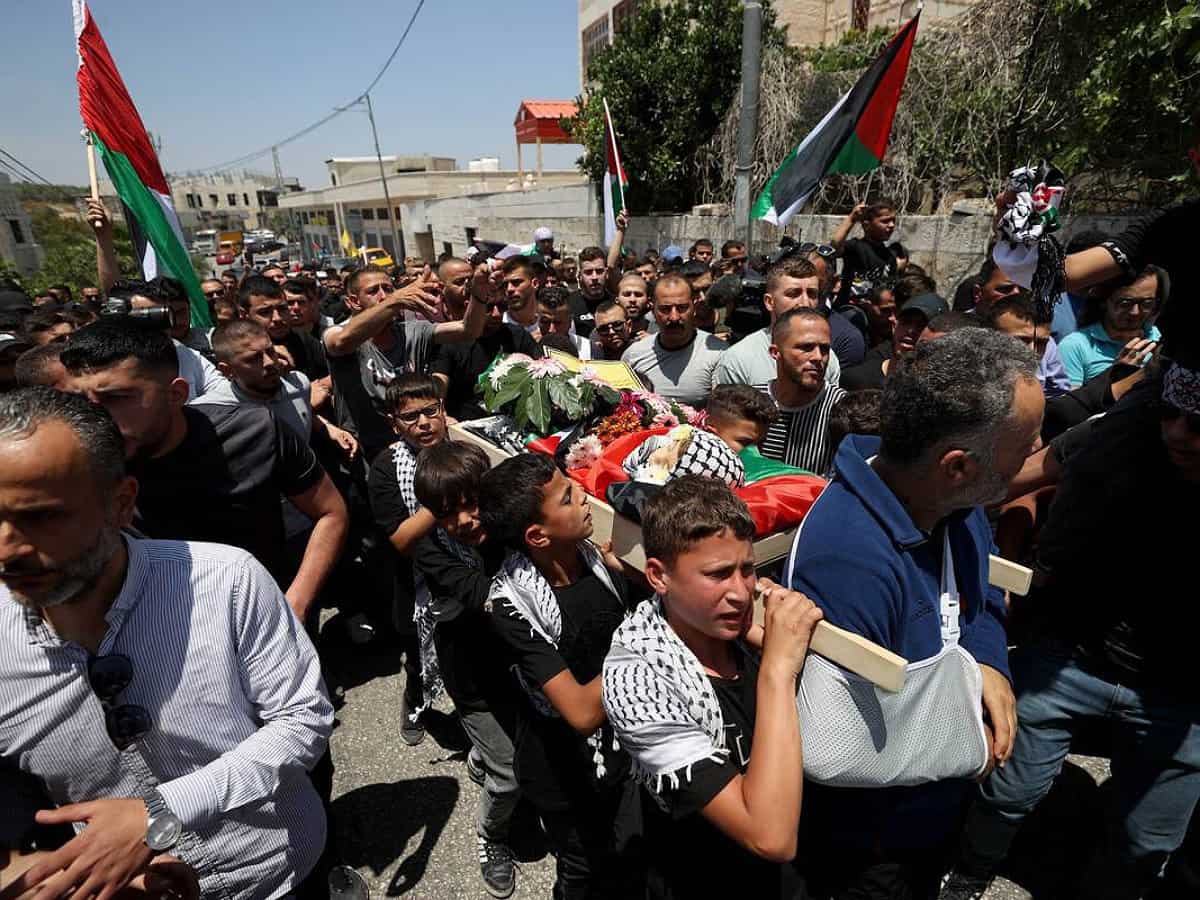
An eight-month pregnant Palestinian woman was shot dead on Sunday, February 9 in the Nur Shams refugee camp which is located in the occupied northern West Bank, which raised fears among Palestinian civilians about the new increased deadly Israeli tactics in occupied territories.
The tragic incident took place when Sondos Shalabi, 23, and her husband Yazan Shula, 26, attempted to escape their Nur Shams refugee camp residence during an Israeli army operation. Before her death, Shalabi had phoned her father-in-law Mohammed to request help because she faced a frightening situation.
Mohammed Shula said the call came in the middle of the night and she was whispering. There was panic in her voice. Shula recalled her saying, “Help, please. You have to save us”. “Minutes later, Sondos Shalabi was fatally shot”, he added.
Israeli new war tactics in the West Bank.
The Israeli military vehicles had cordoned off around the camp for several days through a wider campaign aimed to target the Palestinian-based resentence group Hamas and its other military wings in the northern occupied West Bank after the Israel-Hamas ceasefire came into effect.
Early Sunday, the young couple packed up some clothes and belongings. The plan was simple they would drive to the home of Shalabi’s parents outside the camp, some miles away in Tulkarem where soldiers weren’t operating. It was safer there, and near the hospital where Shalabi planned to give birth. Yazan Shula’s younger brother, 19-year-old Bilal, also wanted to get out and jumped in the backseat.
Not long after the three of them drove off, there was a burst of gunfire. Mohammed Shula’s phone rang.
His daughter-in-law’s breaths came in gasps, he said. An Israeli sniper had shot her husband, she told her father-in-law, and blood was flowing from the back of his head. She was unscathed but had no idea what to do.
He coached her to stay calm. He told her to knock on the door of any house to ask for help. Her phone was on speaker, he could hear her knocking and shrieking, he said. No one was answering.
She told him she could see soldiers approaching. The line went dead, said Mohammed Shula, who then called the Palestinian Red Crescent rescue service.
“We couldn’t go outside because we were afraid we’d be shot,” said Suleiman Zuheiri, 65, a neighbour of the Shula family who was helping the medics reach their bodies. “We tried and tried. All in vain. (The medics) kept getting turned back, and the girl kept bleeding.”
Bilal Shula wasn’t hurt. He was arrested at the scene and detained for several hours.
The Red Crescent said that the International Committee of the Red Cross had secured approval from the Israeli military to allow medics inside the camp. But the paramedics were detained twice, for a half-hour each time, as they made their way toward the battered car, it said.
It wasn’t until after 8:00 a.m. that medics finally reached the young couple, and were detained a third time while rushing the husband out of the camp to the hospital, the Red Crescent said.
Yazan Shula was unconscious and in critical condition, and, as of Tuesday, remains on life support at a hospital. Shalabi was found dead. Her fetus also did not survive the shooting.
Mohammed Shula keeps thinking about how soldiers saw Shalabi’s body bleeding on the ground and did nothing to help as they handcuffed his other son and marched him into their vehicle.
“Why did they shoot them? They were doing nothing wrong. They could have stopped them, asked a question, but no, they just shot,” he said, his fingers busily rubbing a strand of prayer beads.
Israeli security forces invaded the camp some hours later. Explosions resounded through the alleyways. Armoured bulldozers rumbled down the roads, chewing up the pavement and rupturing underground water pipes. The electricity went out. Then the taps ran dry.
Before Mohammed Shula could process what was happening, he said, Israeli troops banged on his front door and ordered everyone his daughter, son and several grandchildren, one of them a year old, another two months old to leave their home.
Mohammed Shula pointed to a bag of baby diapers in the corner of his friend’s living room. That’s all he had time to bring with him, he said, not even photographs, or clothes.
Mohammed Shula further said that his son and daughter-in-law said they started plotting their flight from Nur Shams last week as Israeli drones crisscrossed the sky, Palestinian militants boobytrapped the roads and their baby’s due date approached.
His son “was worried about (Shalabi) all the time. He knew that she wouldn’t be able to deliver the baby if the siege got worse,” he said.
Yazan Shula, a construction worker in Israel who lost his job after the Israeli government banned nearly 200,000 Palestinian workers from entering its territory, couldn’t wait to be a father, Mohammed Shula said.
Palestinians see the shooting of Shalabi as part of a worrying trend toward more lethal, warlike Israeli tactics in the West Bank. The Israeli army issued a short statement afterwards, saying “It had referred her shooting to the military police for criminal investigation”.
Speaking on the military operation motives, Defense Minister Israel Katz said that Israel’s military escalated its operations to prevent “Iran’s proxy Hamas from establishing a new front in the occupied region”.
Another Palestinian became a victim of Israeli war tactics
On the same, just a few streets away, another 21-year-old Palestinian woman was killed by the Israeli army. An explosive device it had planted detonated as she approached her front door.
Responding to her death, the Israeli army said that a wanted militant was in her house, compelling Israeli forces to break down the door. It said the woman did not leave despite the soldiers’ calls. The army said it “regrets any harm caused to uninvolved civilians.”
Ceasefire violation: says Hamas
Following the civilian killings and offensive military operations, Hamas announced that it would delay the next planned release of Israeli hostages from Gaza.
The next handover of three hostages had been scheduled for Saturday, and families say time is running out for those still alive. Israel now awaits what comes from a security Cabinet meeting Tuesday morning, moved up in response to Monday’s Hamas announcement.
Hamas accused Israel of not holding up its end of the deal by not allowing Palestinians to return to northern Gaza, carrying out strikes across the territory and failing to facilitate the entry of aid.
A later Hamas statement called the postponement a “warning signal” to Israel and noted that five days remained for mediators – the United States, Qatar and Egypt — to pressure Israel to act: “The door remains open for the exchange to proceed as planned if Israel abides by its obligations.”
Israeli army’s ground brutality in West Bank
Across the occupied West Bank and east Jerusalem, at least 905 Palestinians have been killed by Israeli forces since Hamas’ October 7, 2023, attack triggered the war in Gaza, according to the Palestinian Health Ministry.
“The basic rules of fighting, of confronting the Palestinians, is different now,” said Maher Kanan, a member of the emergency response team in the nearby village of Anabta, describing what he sees as the army’s new attitude and tactics. “The displacement, the number of civilians killed, they are doing here what they did in Gaza.”
With inputs from AP




